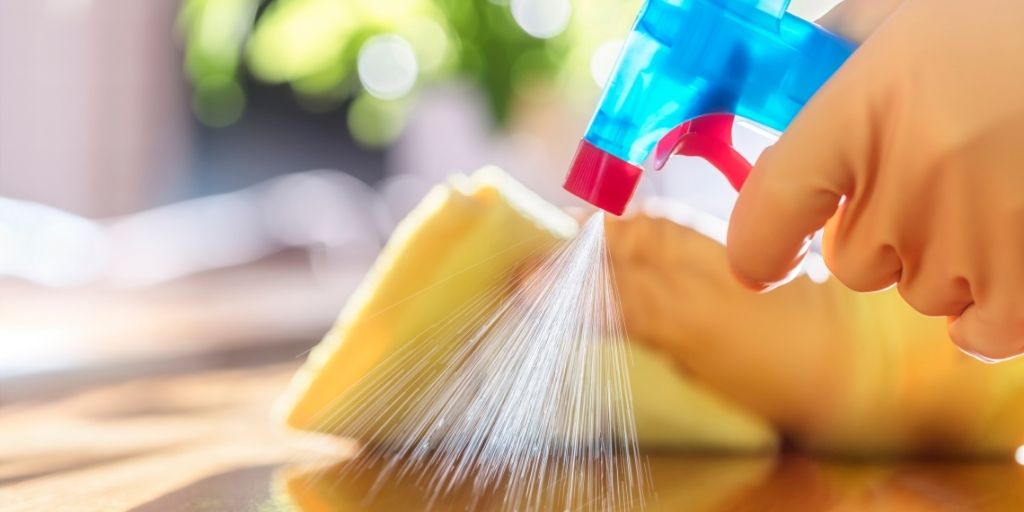 MCEC NEWSLETTER – OCTOBER 2020 MCEC NEWSLETTER – OCTOBER 2020
Covid summer, Chemicals Strategy in the work and engagement with politicians
Hello again dear readers,
We come back to you this early autumn season with fresh and exciting news for microbial control.
First of all, we appreciate that this summer may have been difficult times for many in the context of the global pandemic. We hope you all managed to enjoy a peaceful and resting holiday despite the circumstances.
The back-to-school season was quite shaky this year, notably with the Commission’s inter-service consultation on the Chemicals Strategy for Sustainability. The Strategy is now expected for mid-October and will contain a series of announcements and measures to further streamline EU decision making for chemicals, with the view to make chemistry more sustainable and less hazardous. At MCEC, it triggers more questions than answers at this stage, but the interest is here and the work will surely keep us busy in the coming years.
Alongside the Strategy, the Commission also issued a roadmap mid-September for a “Sustainable Product Initiative”. This will aim to make products placed on the EU market more sustainable and will look at the presence of hazardous chemicals in them. At MCEC, we believe microbial control technologies are part of the solution to make products longer lasting, thus encouraging sustainable consumption. The initiative is opened to stakeholder comments until 2 November and MCEC considers its position in that regard.
We are very glad to announce that MCEC started a series of meetings with Members of the European Parliament (MEPs) in September, to promote microbial control and raise our key messages; more on that below.
All in all, a lot of work is ongoing, and even more is to come looking at the European political agenda for microbial control. MCEC stands up to the challenge – do you?
José Mosquera
Global Industry Leader for Industrial Preservation at DuPont Microbial Control, MCEC Chairman
Want to explore microbial control benefits? More on our website, Twitter or LinkedIn
———————————————————

MCEC is engaging! – Initial feedback from our discussions with EU politicians
As foreseen by its advocacy strategy adopted earlier this year, last month MCEC started to engage with eminent MEPs involved in environmental, chemicals and industry policies.
These online MCEC meetings aim to raise awareness of the benefits and applications that microbial control provides to society. We additionally sought for political support ahead of the forthcoming policy initiatives that may have a disproportionate impact on biocides. MCEC raised the point that biocides play a role in increasing sustainable consumption, in line with the EU objectives under the Green Deal and the Circular Economy agendas. Lastly, we wanted to understand better to what degree the European Parliament understands the full role of biocides in society. The feedback we received is encouraging for microbial control.
- First, there is a general acknowledgement among the politicians we talked to about the need to ensure future-proof access to disinfection solutions in times of Covid and in absence of a vaccine; “you are needed and you will be needed”, we were told.
- Also, we explained the struggle of hazard-based approach for the regulation of biocides. When the functioning and purpose of these substances are exposed, the inconsistencies of only focusing on hazardous properties of chemicals become apparent. We invited our interlocutors to bear these key principles in mind when relevant policy decisions are adopted.
- On a more challenging note, we were told that not enough is known about the value of Microbial Control in products, in industrial processes, in food safety, and to preserve our health in general. MCEC, and the industry in general, were asked to continue to educate the policy makers, and raise further awareness on why Microbial Control is essential for our modern comfort, but also as far as the EU sustainable objectives are concerned.
For MCEC, there is more to come in the months and years ahead, since most of the policy initiatives from the European institutions are yet to be released. These meetings help us to refine our strategy, our messages, and our priorities.
———————————————————

Long-lasting products and consumer benefits: the case for preservation
“Options to completely avoid in-can preservatives are scarce and in general combined with adverse side-effects”, German Institute says.
In April 2019, the German Federal Institute for Occupational Safety and Health (BAUA) launched a survey[i] to assess the current availabilities of in-can preservatives for products such as varnishes, paints and adhesives. In particular, it examined whether there are feasible alternative substances or procedures with comparable effectiveness for in-can preservation, but which represent a lower level of risk. The findings were published this summer[ii]:
- First, the institute recognises that due to previous and ongoing regulation, potential options for in-can preservation of water-based coatings and adhesives in general were narrowed.
- It also acknowledged that the lack of ongoing research for the development of new active substances is caused by the tedious approval process established in the Biocidal Products Regulation (BPR) (EC) No. 528/2012.
- It states therefore that today, product innovation essentially consists of combinations of existing agents.
MCEC company members are committed to a robust risk-based safety assessment of the preservatives they manufacture, so that potential exposure does not lead to adverse effects. In addition, the industry continues to explore other ways of preserving products, such as innovation in packaging, upgrading facilities and production processes to reduce risk of contamination from agents, etc. But these efforts have not led to the possible “avoidance of preservation measures in order to achieve the necessary shelf life to the end products”, BAUA says.
In view of the survey’s results, MCEC members reiterated the call for a risk-based safety approach in the approval of microbial control solutions that target harmful organisms, while ensuring the safety of consumers and professionals.
———————————————————

Disinfection is meant to protect, not harm!
MCEC and its members remind users to pay attention to the use of disinfectants at home and at work in order to avoid unwanted possible adverse health impacts.
Over the past months, media reported that the increased use of disinfectants lead to an increase in notifications to poison centres around the world due to the adverse effects caused through skin exposure, inhalation or even in some cases, ingestion. Research has shown the following examples:
- The US Centres for Disease Control and Prevention (CDC)[iii] reported a 20% increase in calls for incidents connected to disinfectant uses.
- In Belgium[iv], the Poison Control Centre recorded a 15% increase in calls because of drug and alcohol poisoning, or related to the use of bleach, a very-well known disinfectant.
In the vast majority of these cases, the issue came from an evident misuse of the products. Under normal circumstances, and by strictly following the right conditions of use, disinfection causes no harm while protecting people and our surrounding environment.
MCEC and its members reminded all users to follow certain rules when using a disinfectant:
- Strictly comply with the conditions of use of cleaning or disinfecting products which are indicated on the labels;
- Never mix cleaning or disinfecting products with each other;
- Keep all household and alcohol-based products out of the reach of children;
- When applying hand disinfectant, make sure your hands are dry before touching electrically charged objects;
- Do not use floor and surface cleaners/disinfectants for personal hygiene purposes;
- Do not clean food with bleach or any other cleaning or disinfecting product that is not intended to come into contact with food in the first place; and
- In the event of any wrongful exposure to a disinfectant, e.g., the ingestion of an alcohol-based hand sanitizer, immediately call a doctor or emergency services.
While we may not all be able to work on finding the vaccine, we can all take the right preventive measures to keep ourselves and the ones we care about protected.
[i] A. Müller, V. Schmahl, S. Gschrei: Survey on alternatives for in-can preservatives for varnishes, paints and adhesives. 1. edition. Dortmund: Bundesanstalt für Arbeitsschutz und Arbeitsmedizin 2020. pages 57, PDF file, DOI: 10.21934/baua:report20200811, https://www.baua.de/EN/Service/Publications/Report/Gd103.pdf?__blob=publicationFile&v=2
[ii] Survey on alternatives for in-can preservatives for varnishes, paints and adhesives, BAUA, 2020, https://www.baua.de/EN/Service/Publications/Report/Gd103.html
[iii] Cleaning and Disinfectant Chemical Exposures and Temporal Associations with COVID-19 — National Poison Data System, United States, January 1, 2020–March 31, 2020, https://www.cdc.gov/mmwr/volumes/69/wr/mm6916e1.htm
[iv] Number of bleach-related incidents up in Belgium due to COVID-19 fears, Euractiv, May 20, 2020, https://www.euractiv.com/section/health-consumers/news/number-of-bleach-related-incidents-up-in-belgium-due-to-covid-19-fears/
———————————————————
Contact
The Microbial Control Executive Council, or MCEC, is an initiative of the world’s leading companies developing and supplying microbial control technology and solutions. It was established in 2012 in order to promote the safe and effective use of microbial control technologies, and to create a reference point for stakeholders and the public alike to understand the benefits of microbial control technologies and the steps being taken to ensure the use of more sustainable biocides across all applications.
MCEC member companies, BASF, DuPont, ICL, LANXESS, Lonza and Troy Corporation, are committed to the betterment of public health and wellbeing through the advancement of sustainable microbial control technologies.
To learn more, follow us on Twitter, visit our website and our LinkedIn page.
For more information, do not hesitate to contact us at info@microbial-control.com
———————————————————-
www.microbial-control.com
www.cefic.org
|